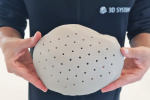3D Systems enables world’s first facial implant manufactured at point-of-care
US-based 3D printer manufacturer 3D Systems has announced the successful use of its point-of-care additive manufacturing solution to produce the world’s first MDR-compliant 3D printed facial implant. Designed and printed within University Hospital Basel, Switzerland, the patient-specific PEEK implant was used in a maxillofacial reconstruction surgery on March 18, 2025.
Founded over 35 years ago, 3D Systems pioneered the additive manufacturing industry with the invention of 3D printing by co-founder Chuck Hull. The company now provides end-to-end solutions for high-value sectors such as medical and dental, aerospace, defense, and industrial manufacturing. With certified facilities in Colorado and Belgium, 3D Systems has supported more than 150,000 patient-specific cases, producing over two million implants and surgical instruments.Point-of-care production with EXT 220 MED
The facial implant, manufactured using VESTAKEEP i4 3DF PEEK from Evonik, was printed on 3D Systems’ EXT 220 MED printer within the hospital’s cleanroom environment. The system’s architecture and simplified post-processing workflow enabled the clinical team, including Prof. Florian Thieringer, Dr. Neha Sharma and biomedical engineers, to design, manufacture, and implement a custom device tailored to the patient’s anatomy.
“Being directly involved in both the design and manufacturing of patient-specific implants, right here in our hospital, allows us to tailor treatments precisely to individual needs, respond faster, and improve surgical outcomes,” said Prof. Thieringer.
The EXT 220 MED has already been deployed in more than 80 cranial implant surgeries at hospitals since its launch in August 2023. The solution combines cleanroom-based extrusion 3D printing with an expanding pipeline of medical applications, helping to shift personalized implant production closer to the point of care.
EXT 220 MED Printer – Photo via 3D Systems.
Driving clinical innovation and market growth
For over a decade, 3D Systems’ VSP surgical planning technology has helped clinicians plan complex procedures using digital workflows and an extensive materials portfolio. This clinical integration, bringing engineers, surgeons, and manufacturing together, offers a significant advantage over traditional off-site production methods. The approach reduces treatment delays, enhances precision, and lowers costs.
Stefan Leonhardt, Ph.D., Director of Medical Devices at 3D Systems, noted, “We are proud to collaborate with the pioneering clinicians at University Hospital Basel and other leading hospitals worldwide to expand the applications that can be addressed with additive manufacturing. Since its launch in August 2023, our innovative solution has already been utilized in more than 80 successful cranial implant surgeries at partner hospitals, demonstrating its swift integration and real-world effectiveness in delivering personalized patient care. The successful use of the EXT 220 MED for maxillofacial implants showcases our commitment to ongoing innovation that delivers personalized healthcare solutions for new applications.”
According to 3D Systems, the 3D printed maxillofacial implant market exceeded $2 billion in 2024 and is projected to surpass $4 billion by 2034. As demand grows, the company continues to expand the clinical applications of additive manufacturing across a range of medical disciplines.A growing shift toward in-hospital manufacturing
Point-of-care additive manufacturing, the ability to produce medical devices directly within clinical settings, is transforming how patient care is delivered. This approach minimizes the need for external suppliers, reduces turnaround time, and enables true personalization in treatments.
A notable example is 3D Systems’ earlier collaboration with University Hospital Basel, where the company supported the creation of the first 3D printed cranial implant produced on-site under current Medical Device Regulation (MDR) standards. That breakthrough laid the foundation for the recent facial implant milestone and highlighted the feasibility of integrating 3D printing into hospital infrastructure.
Elsewhere, Ricoh USA has opened the RICOH 3D for Healthcare Innovation Studio within Atrium Health Wake Forest Baptist, where clinicians can directly design and manufacture FDA-cleared anatomic models. By localizing production, hospitals are gaining more control over surgical planning and execution while improving efficiency and outcomes. As interest grows, these initiatives signal a broader move toward distributed, patient-specific manufacturing workflows within the healthcare system.What 3D printing trends should you watch out for in 2025?
How is the future of 3D printing shaping up?
Subscribe to the 3D Printing Industry newsletter to keep up with the latest 3D printing news.
You can also follow us onLinkedIn and subscribe to the 3D Printing Industry Youtube channel to access more exclusive content.
Featured image shows The VSP PEEK Cranial Implant is the first FDA-cleared, additively manufactured PEEK implant intended for cranioplasty procedures to restore defects in the skull. Photo via 3D Systems.


